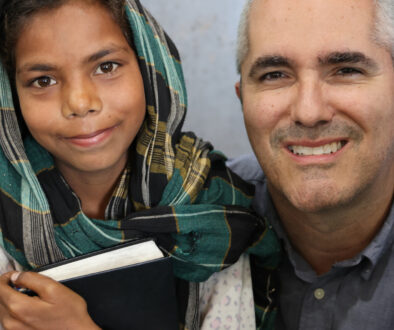The church in Paraguay and the revelation of God’s fatherhood
We are in Pedro Juan Caballero, Paraguay, deploying children’s relief fronts in partnership with the Actos de Justicia Church and serving the Paraguayan church by holding seminars on healing, leadership, and revival. We are a 9 missionaries’ team and we will also go to Asunción, the capital of the country.
Paraguay still has a great wound that originated in the Paraguayan War. In losing the war, in addition to the families destroyed, many also lost hope. Many families today still need restoration, and missionary work is extremely necessary for this nation. Last night, as I prayed, the Spirit taught in my heart that many Paraguayans do not believe that the Father can and wants to restore them because they feel that they are not worthy. I was led by the Spirit and shared three aspects that hinder the revelation of God’s fatherhood, based on the parable of the lost sheep, the lost drachma, and the prodigal son (Lucas 15).
The rejection and the lost sheep (Lucas 15:3-7)
The lost sheep (1 in 100) also reveal important aspects of rejection. It is noticed that the lost sheep, when distancing itself from the others, also isolated itself. This is one of the symptoms of people struggling with rejection. Rejection obfuscates the fatherhood of God, for there is an inner tendency to transfer to God what we experience in our history, especially with our natural parents. God often allows men to reject us so that we may be healed, He does not reject us, but we need to experience His acceptance in difficult situations. In other words, man can reject us, but we must see in our walk that He does not abandon us. I want to tell you with all conviction that we have a Father who leaves the 99 in the desert and goes to the sheep that was lost until he finds it and returns it to his place of destiny and communion. This is the character of our heavenly Father. The revelation of God’s fatherhood is indirectly proportional to the symptoms of rejection.
The losses and the lost drachma (Lucas 15:8-10)
There are also material losses in our history. Many losses occur because we are not careful. Material losses are also expressed in the main parable about forgiveness, the parable of the incomprehensible creditor (Matthew 18: 23-35). Losses can feel like God is not the provider of our needs. The parable of the lost drachma is about a woman who lost 1 drachma (1 out of 10). She lights the lamp, looks for it, and finds her drachma. God and his word is the light that illuminates and helps us to find what was lost (Ps. 119: 105). He is the light that needs to enlighten our hearts to recognize Him as the Father provider and protector of our lives. Being guided by God and His Word certainly drives us to true forgiveness, especially in relation to those who have hurt us and brought us profound harm. True forgiveness is also the way to receive the revelation of God’s fatherhood.
The forgiveness of oneself and the prodigal son (Lucas 15: 11-32)
Family issues are the most painful. The parable of the prodigal son speaks of the youngest son who requested his goods and left the presence of the father to live a dissolute life. After finishing the goods and going through many needs, including hunger, he decided to return to his father’s house to be received as a possible employee. The father, seeing him from afar, receives him with extreme joy as a son and changes his clothes, which means the pardon of the father by the blood of the lamb and restoration of identity; puts a ring on one of his fingers, which signifies a renewal of alliance and reception of authority; and puts a new sandal on his feet, which means firmness for his sending and walking. This whole story is developed in the relationship between the son and the father. This is the only passage that speaks of forgiveness of self. When we receive a pardon from the father, we know more deeply the paternity revealed in his grace.
This is one of the words we have given about paternity in the Paraguayan church.
I invite you to open your heart and live what the Father has for your life!
Leonardo Paulino






